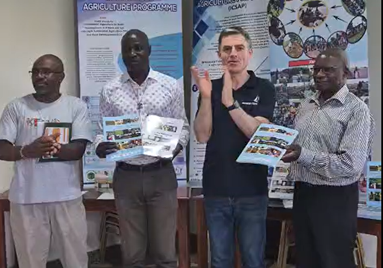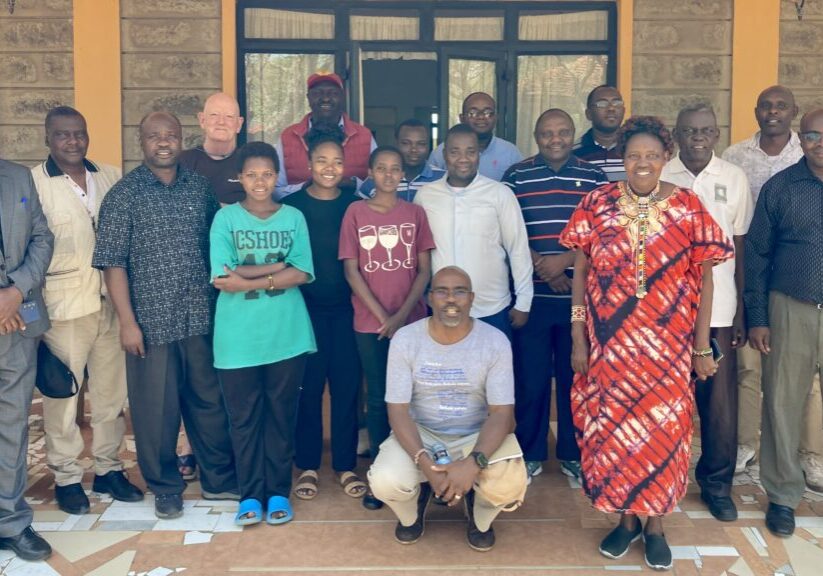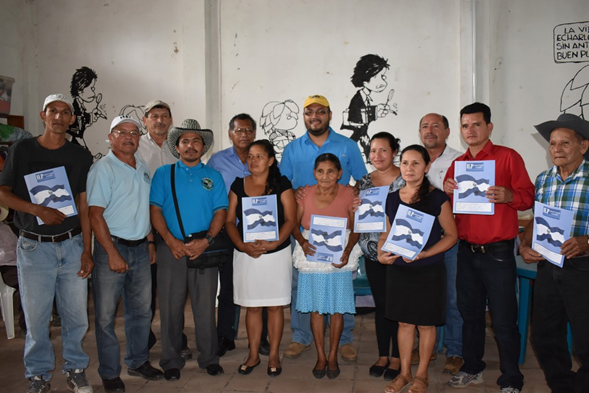
For Human Rights Day 2021 – with its theme of Reducing Inequalities: Advancing Human Rights – we’re looking at the issue of women in peacebuilding through the eyes of women in Latin America, some of whom are being supported through Misean Cara members’ human rights projects.
This is the subject of a Learning Brief recently published by Misean Cara, which took root in a listening forum for women from Colombia, El Salvador, Guatemala, and Peru, held in April of 2021. The online event, called “Women in Peacebuilding: Voices from Colombia, El Salvador, Guatemala and Peru” gave women from a variety of projects and women’s groups in the region the chance to ‘give voice’ to their experiences and struggles, actions for justice, future hopes and plans.
In one example, organised women in Colombia described their efforts to uphold their right to an end to violence in their territories, among them former combatants from the Revolutionary Armed Forces of Colombia-People’s Army (FARC-EP by its acronym in Spanish) who demobilised and reintegrated into society; contributing to building a just peace; and working to realise women’s rights, tackle Gender-Based Violence, improve their economic situation, and play a full role in society.
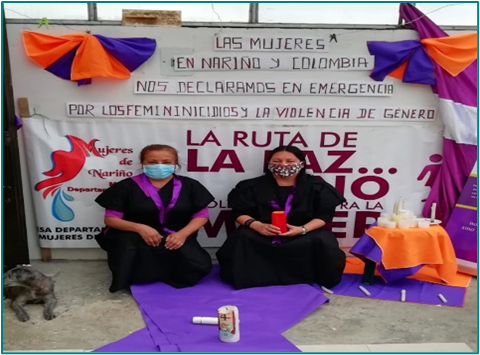
They spoke of the multiple, inter-related challenges women generally face in realising their rights, and additional issues faced by different groups among women – including Afro-descendant and indigenous or mestizo women, and groups facing environmental/ecological issues.
“…since the [peace] agreements were signed in November 2016, until March this year, more than 1,150 leaders, women leaders and human rights defenders have been assassinated; of these, almost 30% are indigenous and around 15% are women.”
-Fabio Mesa (SERCOLDES)
“…since the [peace] agreements were signed in November 2016, until March this year, more than 1,150 leaders, women leaders and human rights defenders have been assassinated; of these, almost 30% are indigenous and around 15% are women.”
Fabio Mesa – SERCOLDES
In El Salvador, women survivors and female relatives of the El Mozote massacre during the country’s civil war have played a central role in a project seeking justice, rights, and full State implementation of a compensation and reparations programme. Many women managed to overcome trauma and well-founded fears to give evidence to courts; to dialogue with government, lawyers, and other parties; and emerge as leaders in the campaign for truth, justice, and human rights.
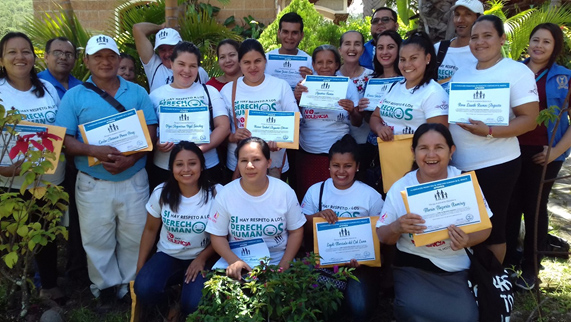
Graduates of a Human Rights Workshop in El Mozote, El Salvador 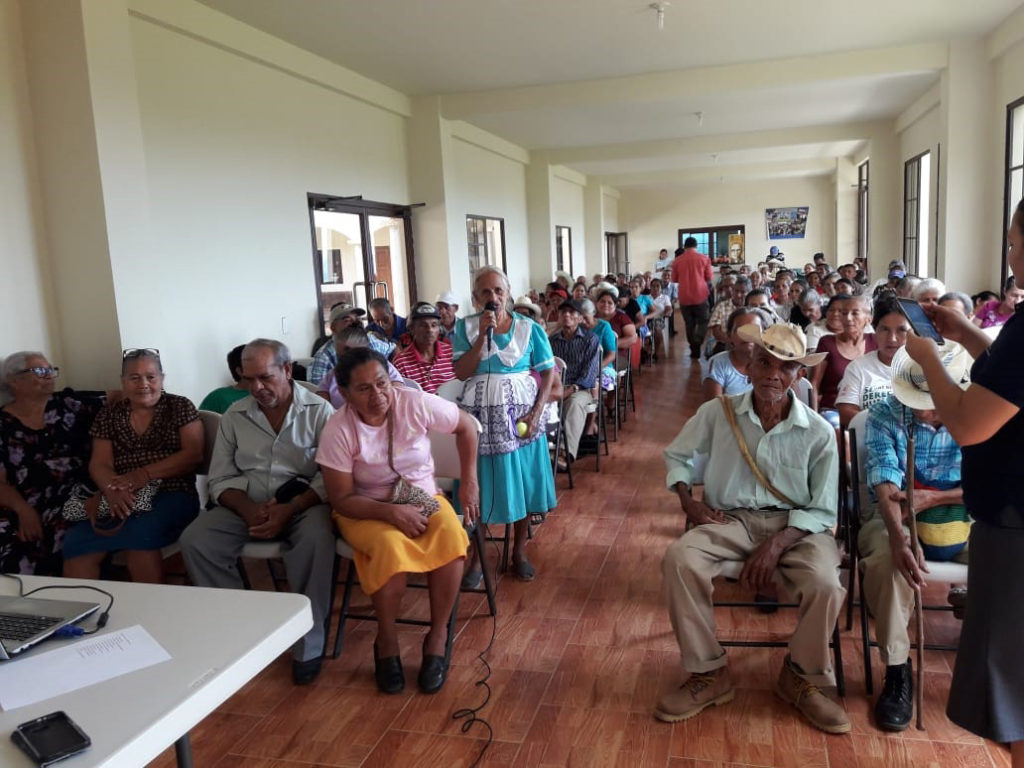
Intercommunity meeting of elderly victims, El Mozote, El Salvador.
Mayan women in Guatemala cited their suffering and struggles, but also their determination to seek justice, arising from the army’s brutal campaign to terrorise civilians and brutalise women in its effort to defeat guerrillas in the countryside during the country’s civil war. Mayan women were not only subjected to systematic rape and other forms of SGBV but also stigmatised by their own community and then vilified and retraumatised by institutions of the state as they sought justice. Even now, after criminal prosecutions of state forces, their struggle continues for reparations.
Misean Cara’s meeting of women peacebuilders in Latin America this year, which will be followed up on the 15th December, also heard of the struggle of indigenous women in Peru – particularly to access and defend communal land (which underpins their culture, identity and personal dignity).
They are struggling to defend themselves in the face of land-grabbing, exploitation, and encroachment by extractive industries – but also to defend recognition of the rights of Mother Nature, without whom there is no continuity of life for them.
“In the defence of Mother Nature, we also suffer violence, macho violence in our communities, that see indigenous women as inferior, for this reason we are controlled; controlled by the men of the community”.
Melania Canales, ONIAMAP – Peru
The Learning Brief that emerged from these women’s reflections – elaborating examples of the slow, sometimes painful work of women in peacebuilding – fits very well with Ireland’s foreign policy objectives (as outlined in A Better World) on intensifying work on Women, Peace and Security from local to global levels, and particularly in conflict and post-conflicts settings.
The project work of Misean Cara members that is drawn from here squarely supports Ireland’s development cooperation commitments to protection, gender empowerment and equality, and strengthened governance – and the purpose of the Irish Consortium on Gender-Based Violence, to build a world without fear of violence against women and girls.
Reflecting on their common experience, the different groups of women involved in these projects identified how:
- Women are exposed to greater vulnerabilities, and specific risks, by virtue of being women in unequal societies.
- Women have a different exposure to and experience of violent conflict than men.
- Sexual violence against women is frequently used as a systematic practice – not just by males or ‘armed actors’ but often by the state itself.
- Women are not a homogeneous group in society and some women with specific characteristics (e.g., indigenous women, ex-combatants, formerly enslaved women, or women from minority language backgrounds), or women in specific geographic locations, face specific and additional dangers during and after conflict situations.
- Bringing to justice the perpetrators of violence is important to women, to society, and peacebuilding. Impunity cannot be allowed.
- Women have come a long way, often at high personal and community cost, in fighting for recognition of their rights and the violations imposed on them.
- Peace is built slowly and with difficulty after violent conflict, not secured by signing treaties.
- It’s important to see and recognise women, and women’s organisations, as important change agents within struggles for justice and peace building – with their own objectives, strategies, and stories – and not as ‘victims’ without agency and purpose.
- Women seek allies in, and value support for, their struggles for justice and a ‘positive peace’ (without violence) – but they do not want to be side-lined, or their contributions to be rendered invisible, as so often happens.
The women’s participation in these human rights, social justice, and peacebuilding projects – and expression of their experiences, struggles, and desires for family and society – can contribute to understanding, in Ireland and more widely, of the women, peace and security agenda.
The Learning Brief, titled Women in Peacebuilding: Voices from Latin America, emphasises how women are far more than ‘victims of violence’, but also stand up to act for transformative change, to build peaceful societies (not just relying on peace agreements), to strive for justice, and to mobilise for states and societies to vindicate their human rights – throughout both spells of violent conflict and in recovery and rehabilitation efforts.
It also emphasises the continuing role of faith and civil society actors, in different ways in different contexts; and the vital importance of giving women actors meaningful voice – and heeding what they say – in discussions around UNSC 1325 and the Women, Peace and Security agenda.
